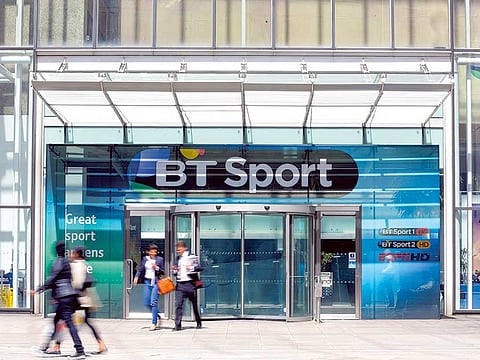BT to run network arm Openreach as separate unit
Britain’s biggest telecom group avoids break-up after year-long investigation

London: Britain’s telecoms regulator ordered BT on Tuesday to run its network division as a separate company within the group, to improve national broadband coverage and avoid the need for a full break-up of the firm.
Rivals to Britain’s biggest telecoms group have for years accused BT of using the division to its own benefit, ploughing profits from the network into boosting BT’s broadband and TV offerings — at the expense of smaller competitors, which also rely on the network.
Competitors such as Sky and TalkTalk, which use Openreach infrastructure, also accuse the 170-year-old BT of underinvesting in the business, damaging competition and coverage across the country, and have called for BT to be broken up.
But after a year-long investigation Ofcom ruled that instead of a full break-up, Openreach should be placed in a legally separate company, with an independent board and control over its budget, staff and customer base.
Overall investment levels will be set by BT however.
“We welcome Ofcom’s recognition that structural separation would be a disproportionate move,” BT said in a statement, after agreeing to the majority of the proposals.
Its shares rose more than 4 per cent.
Under the plans Openreach will have its own board with a majority of non-executive directors, including the chairman, who will be not be affiliated to BT. Instead they will be appointed and removed by BT in consultation with Ofcom.
The Openreach chief executive will also be appointed by, and accountable to, the Openreach board. And Openreach will be obliged to consult formally with customers such as Sky and TalkTalk on large-scale investments.
There will also be a ‘confidential’ phase during which customers can discuss product and other ideas without this being disclosed to BT Group, Ofcom said.
Finer details
“This model would provide Openreach with the greatest degree of independence from BT Group that is possible without incurring the costs and disruption — to industry and consumers — associated with separating the companies entirely,” Ofcom said.
“If it cannot achieve this, Ofcom will reconsider whether BT and Openreach should be split into two entirely separate companies, under different ownership.”
BT said it agreed to the majority of the proposals but the two sides are yet to agree the finer details about how it will be separated, in terms of the division of assets and staff. One outstanding issue is what would happen to the BT pension scheme and whether any of this would be assigned to Openreach.
The bosses of Sky and TalkTalk, Jeremy Darroch and Dido Harding, said the proposal was a step in the right direction but they regretted that Ofcom had not taken the step to spin Openreach off completely.
Analysts said the plan was broadly in line with expectations. It should go some way to allaying the concerns of rivals and also gives Ofcom the chance to easily force the complete separation of Openreach if it is not deemed to have been a success.
“BT will retain control over the overall budget for Openreach and it appears that it will be able to recoup any costs associated with the reorganisation,” said Andrew Hogley at Mirabaud.
“Longer-term BT Retail should have no strategic advantage versus Sky and TalkTalk in terms of its relationship with Openreach. This may have an impact but... we expect these to be modest.” The regulator will now launch a consultation until October 4 to get the opinions of those in the sector.



